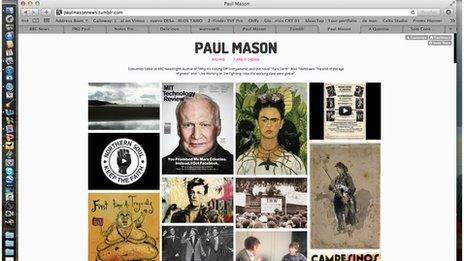I meet Tumblr whizz-kid David Karp
- Published
- comments

There's a joke running around about social media: Facebook, external is how you want people to see you, Twitter, external is how you see yourself; Tumblr, external is - "Hey look! Funny cat picture meme!"
If so David Karp has raised a heck of a lot of money on the back of funny cat pictures. The 26-year-old who invented Tumblr is currently burning through $125m of venture capital in his quest to make Tumblr, at some point, make money.
"It started pretty modestly," he says, "I had tried to set up blogs, I tried to tweet, used Flickr and Delicious, I wanted something that allowed me to be more expressive, to present myself in a way I was proud of."
So Karp, who had dropped out of high school and went straight into the digital media business in his teens, built Tumblr.
If you are wondering what Tumblr is you are probably a) over 24 b) not involved with Occupy Wall Street c) not a member of the teenage-girl-nail-art subculture. And you have no idea what social curating is.

David Karp says curation allows people to be creative through what they select
Curating is the new buzzword in the media: it even worked its way into the recent mission statement of BBC boss George Entwistle.
So… curating is somewhere between creating and consuming: you pull together stuff you like, photos, animated GIFs, YouTube videos, quotes. Much as modern dance music is made up of samples, and postmodern art made up of "found" objects, re-assembled by the artist, Tumblr is about using the found to say something different.
"Even if you're not the guy who gets in front of the camera and plays guitar," says Karp, "you can still express a point of view, be creative, through the stuff that you select."
"At the core we have this community of millions of creators who make the stuff - and around them this big web of tens of millions of curators, people who are slicing and dicing it into little channels, blogs full of the stuff they care deeply about. And they have this big audience of 150 million people who show up every month who can find the content organised into channels that can be so nuanced, thoughtful and specific."
As millions of people share similar content, what digital theorists call "memes" are created. Common themes, images, sayings etc that define the zeitgeist and proliferate, morph etc.
Tumblr is an extraordinary powerful amplifier of memes: instead of posting, say, a funny cat picture to Facebook, I will reblog it from somebody else - getting on the bandwagon, so to speak. But then my page may contain two or three entirely separate bandwagons. Probably the best known meme originating on Tumblr in the past year was the "We are the 99%, external" stories from Occupy Wall Street.
If I look at my own Tumblr account - I've had one since an art activist called @spitzenprodukte told me doomily "Facebook is over" - it does not quite conform to the anti-narcissist joke I began with.
So my meme creation tends to involve: Liza Minnelli (I know), dance numbers featuring Rita Hayworth (I said I know!). That's alongside Gettysburg the movie and numerous Northern Soul tracks, photos of Frida Kahlo, Manhattan in the 1950s and - big error this - a GPOY.
GPOY stands for "gratuitous photos of yourself" and is more or less obligatory on Facebook but deeply uncool on Tumblr.

The 'We are the 99%' Occupy movement meme started on Tumblr
Other stuff I've posted includes graphs of Spanish debt; blogs the BBC system was too, er, analogue to accept on a Sunday morning.
What has caused Tumblr to take off is the relative difficulty of achieving this level of narcissism (or self-expression) even on the uber-platform Facebook.
Says Karp: "We're giving them tools to make create an identity they can be really proud of; you do it on a page you can control completely. No two Tumblr blogs look alike."
And the Tumblr demographic is seen as politically significant. Though it has only 150 million users - compared with Facebook's one billion - there is a different emotional intensity, and a cliquishness: very few people find their grannies and aunties, or old school friends in their Tumblr social network. It's more likely to be people who share the same obsessions.
Tumblr, anecdotally, is in America at least not just quite young but quite working class: there's a lot of tattoos, piercings, trailer lifestyles. There is a troubling amount of self-disdain: it's easy to summon up a screen full of anorexic young women, people suffering depression, graphic images about teenage self-harm. And of course pornography.
But despite the sleazy - or is it just brutally honest - side of Tumblr, this critical demographic reach has brought campaign managers from both sides of the US presidential race onto the platform.
I ask Karp what the content posted on Tumblr is telling us about the world:
"Ten years ago there were maybe hundreds of people creating digital content; I wanted to be one of those prolific people, with an identity and a presence. Today there are millions of people making stuff and putting it into the world: that's become part of our identity and it shouldn't be limited to people who fancy themselves writers, or who are particularly witty or talented: curation is a new, more accessible way to express yourself."
"We used to have a text blurb on our networks, the Geocities - a blank slate you hacked together; then MySpace where you had more structure but you could still hack it to pieces: it was ugly, but it was still very personal, if a little janky looking. Then we got Facebook and we left all that behind, everybody had the same vanilla page, in a big directory of other people."
Ultimately for Karp the challenge is to make money. There are reports that investors are getting antsy about the lack of a coherent business model.
He tells me his first aim is to keep the product simple: to allow the space itself to be a basic platform with third party developers (my own Tumblr blog front end cost me about £10 from a specialist designer, though most people opt for the free customised version).
"Our model is pretty simple: we have the attention of an audience of 150 million people - we're selling a little sliver of that attention to marketers. How you do this in a zen-like interface, it requires an enormous amount of care. You don't want to bolt on a button to your Kindle to make ads go away - so we have built advertising into the endemic features," Karp says.
But he believes the momentum is with the content creators. The smart phone is turning more of us into creators, even if - as we cluster around the same mass events using the vintage photo effects - a lot of our "creations" look exactly the same:
"All of this stuff is gated on the hardware: Apple and Google are pushing the hardware so far, so quickly... and as the creative horsepower moves faster and faster the software is going to explode: there is a whole ecosystem of creative apps. So what I am most excited about is what people are making."
Tumblr is going to face challenges over the use of other people's content, let alone censorship issues over the amount of porn, self-harm etc that presents itself on the simplest of searches.
But whatever happens commercially, Tumblr is yet another straw in the wind of the social media revolution.
MySpace went big, was bought by Rupert Murdoch and then declined. Facebook killed MySpace, went public at what looks like a massively over-valued price, and now faces big questions about how it will make money going forward.
Tumblr - and its rival "curating" platforms - are one clue as to what might, one day, if this is even thinkable, kill Facebook. Facebook, to me, is increasingly like a family living room at Christmas in the 1970s, with a lot of people I am supposed to be polite and friendly to.
Ultimately we are all, inside, still teenagers in our bedrooms, and Tumblr is like a bedroom wall where you can pin anything. And shut the door to keep your parents out.
Watch Paul Mason's full interview with David Karp on Newsnight on Thursday 1 November 2012 at 10.30pm on BBC Two, then afterwards on the BBC iPlayer and Newsnight website.